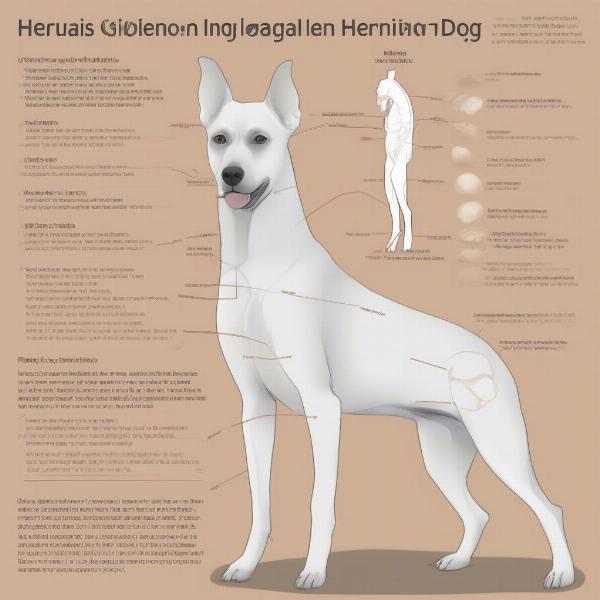Understanding the cost of dog hernia surgery in the UK is crucial for any pet owner facing this situation. This guide will cover various aspects of canine hernia surgery, including types, diagnosis, treatment options, cost factors, and post-operative care. We’ll delve into the specifics of what to expect and how to prepare, empowering you to make the best decisions for your furry friend.
Understanding Canine Hernias
A hernia occurs when an organ or tissue pushes through an opening in the muscle or tissue that usually contains it. In dogs, hernias can be congenital (present at birth) or acquired (develop later in life). There are several types of hernias that can affect dogs:
- Umbilical hernias: These are the most common type and appear as a soft swelling near the belly button.
- Inguinal hernias: These occur in the groin area and can contain intestines or fatty tissue.
- Diaphragmatic hernias: These involve the diaphragm, the muscle separating the chest and abdomen. This type is often more serious and can be life-threatening.
- Perineal hernias: These occur near the anus and rectum.
 Types of Dog Hernias
Types of Dog Hernias
Diagnosing a hernia usually involves a physical examination by a veterinarian. They may also use imaging techniques like X-rays or ultrasounds to confirm the diagnosis and assess the severity.
Dog Hernia Surgery: What to Expect
Surgical repair is the most common treatment for hernias in dogs, especially if they are causing discomfort or pose a risk of complications. The specific surgical procedure will depend on the type and location of the hernia.
During surgery, the veterinarian will make an incision to access the hernia. They will then carefully push the protruding tissue back into its proper place and repair the weakened muscle or tissue wall. Sometimes, a mesh is used to reinforce the repaired area and prevent recurrence.
Dog Hernia Surgery Cost in the UK
The cost of dog hernia surgery in the UK can vary significantly depending on several factors:
- Type and complexity of the hernia: Diaphragmatic hernias, for instance, are generally more complex and costly to repair than umbilical hernias.
- Size of the dog: Larger dogs may require more anesthetic and longer surgical time, impacting the cost.
- Location of the veterinary clinic: Prices can differ between urban and rural areas, as well as between different clinics.
- Additional tests and procedures: Pre-operative blood work, imaging studies, and post-operative medications can add to the overall cost.
On average, dog hernia surgery in the UK can range from £500 to £2,000 or more, with complex cases potentially exceeding this amount. It’s essential to discuss the expected costs with your veterinarian before proceeding with surgery.
Post-Operative Care
After surgery, your dog will need careful monitoring and pain management. The veterinarian will provide specific instructions regarding activity restriction, wound care, and medication administration.
Recovery time typically varies from a few weeks to several months, depending on the type of hernia and the individual dog’s healing process. Regular check-ups with the veterinarian are crucial to ensure proper healing and address any potential complications.
Financial Assistance for Dog Hernia Surgery
If you are struggling to afford the cost of surgery, several options might be available:
- Pet insurance: If your dog has pet insurance, check your policy to see if it covers hernia surgery.
- Charitable organisations: Some animal charities offer financial assistance for veterinary care.
- Payment plans: Some veterinary clinics offer payment plans to help spread the cost of treatment.
Conclusion
Dealing with a dog hernia can be stressful, but understanding the procedure, expected costs, and post-operative care can help alleviate some of that anxiety. By working closely with your veterinarian and exploring all available options, you can ensure your furry companion receives the best possible care. Don’t hesitate to contact your vet to discuss any concerns or questions about dog hernia surgery. Early diagnosis and treatment are crucial for a successful outcome.
FAQ
- How do I know if my dog has a hernia? Look for unusual swellings or lumps, especially around the belly button, groin, or anus. If you notice anything unusual, consult your veterinarian.
- Are all hernias in dogs require surgery? Not all hernias require immediate surgery. Small, uncomplicated hernias may be monitored, but surgery is often recommended to prevent complications.
- How long does it take for a dog to recover from hernia surgery? Recovery time varies, but it typically takes several weeks to a few months.
- What are the potential complications of dog hernia surgery? Complications are rare but can include infection, swelling, and recurrence of the hernia.
- Can hernias in dogs be prevented? Some hernias are congenital and cannot be prevented. However, maintaining a healthy weight and avoiding trauma can reduce the risk of acquired hernias.
- Is dog hernia surgery painful? While the surgery itself is performed under general anesthesia, your dog may experience some discomfort during recovery. Pain medication will be prescribed to manage this.
- What should I do if I notice a swelling after my dog’s hernia surgery? Contact your veterinarian immediately if you notice any unusual swelling, redness, or discharge from the surgical site.
ILM Dog is a leading international pet website dedicated to providing reliable and practical information on all aspects of dog care and upbringing. From breed selection to health, training, nutrition, and grooming, we offer expert advice for both new and experienced dog owners worldwide. We also cover specialized topics such as puppy care, senior dog care, traveling with dogs, and product reviews. Visit our website at ILM Dog for a wealth of valuable resources. Contact us at [email protected] or +44 20-3965-8624 for any inquiries.